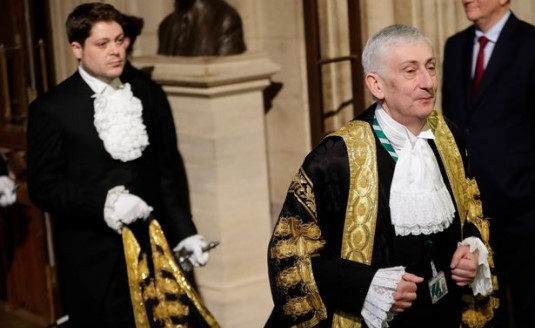
Having gathered a community of interest around the issue, including an eyebrow raising Theresa May, it looked a dead cert that the government would be defeated as the opposition benches joined with the Tory dissenters. The only difficulty, and what ultimately sank it, was the means by which this thoroughly deserved setback was to be administered. With the government's Advanced Research and Invention Agency bill making its way through the Commons, this innovation agency - a brainchild of the unlamented Dominic Cummings and set up to pour state money into radical technology projects - would be forced to make up the shortfall in the Overseas Budget had the rebel amendment passed. However, there was a risk of the Speaker dismissing it because of the lack of connection to the bill before the house. For example, casting our minds back to the parliamentary battlefront during the Brexit wars, when May was bringing her deal to the Commons for the third time, if a sympathetic backbencher had moved an amendment that would see a doubling of honourable members' salaries, this could, and in all likelihood would have been rejected by John Bercow on these grounds.
Today, our current Speaker Lindsay Hoyle said no. In ruling it out, he said the government should bring overseas aid to the House so MPs could have their definitive say on it. Fat chance. If he was worth a hill of beans he would have forced the government's hand by accepting the amendment as a means of forcing them to respect the modicum of democracy the Westminster system allows. It comes down to how one conceives the speakership. Should the Speaker try and make up for the advantages the government has by championing the backbench member and empower them so the executive can be held to account? Or is the Speaker the custodian of tradition, the preserver of the constitution, and working to keep the bewildering pomp and obscurity going? Bercow, a Tory, was very much a facilitator of accountability. Hoyle, nominally a Labour MP, a Labour MP clings to process, fetishising the form over the meagre democratic content.
This is not a coincidence. Several summers ago, the crowds gathered beneath Elizabeth Tower to hear Big Ben ring out for the final time for four years. As noted then, it was always going to be Labour MPs who got dewey eyed over the stilling of the bongs. And likewise, Labour MPs tend to be more attached to the ludicrous, alienating traditions of the Commons than their counterparts on the Tory benches. Plenty have commented on the private school ethos of the place, and how its obscure rules and stuffy atmos is specifically contrived to remind MPs from the lower orders that this is not theirs. A lot of Labour MPs, however, absolutely love it. Having secured a seat against the odds, what most would find alienating is actually flattering. They're being welcomed into the most exclusive political club of all, they're there by their sweats and talents, and they've earned it. It might bewilder, it might induce a sense of inferiority, especially with posher MPs about acting like they're very much at home, but because of their election, their elevation, they cling to if not enjoy the traditions and stupidities of the place. It affirms and confirms them as a cut above.
This is why we have such a contrast. The Tory Bercow was the most radical speaker of recent times. He was entirely at home running the Commons, having spent decades circulating around the top of the party's tree and, at one point, training other Tory politicians for their political careers to come. For Labour's Hoyle, he is as conservative and as plodding as they come. Hardly surprising considering he comes from a working class dynasty. A red prince before the term was coined, he entered the Commons just as his dad was kicked upstairs to the Lords, and in the days following her death telegraphed his penchant for sycophancy by calling for a national children's hospital named after Princess Diana. When one has a feel for the game, when it's as much a part of you as you are of it, the rules, the niceties, the ways of doing things can be bent to one's will. When one isn't, unless armed with a class analysis - which some MPs in recent times were - the tendency is to venerate, fetishise, and preserve. And in the case of Lindsay Hoyle, as it is destined to be during his spell in the chair, his first instinct to abide by the conventions and niceties of his holiest of holies will see him back the government each and every time.
Image Credit
2 comments:
I believe the proper term is parliamentary cretinism.
Need I say more?
Reminds me of Sir Richard Rich, or Lord Boffy.
Post a Comment